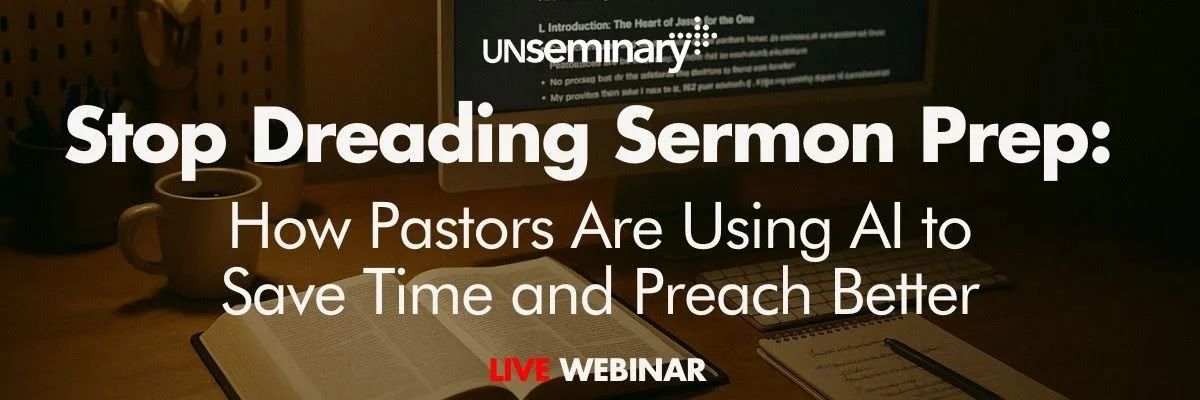Is AI Taking Over?
It seems that AI is everywhere these days. Lots of it without me even asking for it. And the Church is talking about it too.
At this year’s General Council of the United Church of Canada, the development of an AI policy was considered and it was agreed to study this issue and report back in a year or two (or so I was told by those who were in attendance - I’m happy to be corrected!)
In mid-August, Ministry Forum hosted one of its Lilly Grant Webinars on the topic: Becoming Ourselves with AI: A conversation about change, faith, and possibility where we talked about a +AI Mindset - co-creating with AI.
We weren’t the only ones hosting conversations about AI. I don’t know what it was about mid-August but it was like a feeding frenzy and it wasn’t even Shark Week (that was back on July 20)… I saw five different AI webinars related to the Church and ministry leadership, even one hosted by Carey Nieuwhof. Someone passed along this YouTube video about Spiritual formation and AI: A deep dive with Andy Crouch and Jay Kim to me the very same week.
There’s a space on CHURCHx (where we host our e-content) focused on AI called “Prophets, Priests, and Prompt Engineers" where a network of people interested in talking about the intersection of faith and AI gather. It is faciliated by Rev. Tay Moss who leads CHURCHx and seems to be everywhere talking about AI and the church - he has some talks planned at the upcoming American Academy of Religion Conference in the Fall and is a guest on many podcasts and other venues like this one entitled Using AI to Supercharge Ministry where he introduces AskCathy 3.0, a groundbreaking Episcopal AI agent designed to support lay leaders and clergy with verifiable, theologically sound, and accessible guidance.
🎶 A-I-A-I-Oh my…
I did check out the one hosted by Rich Birch of unSeminary called Stop Dreading Sermon Prep: How Pastors Are Using AI to Save Time and Preach Better. As stated best by Rich, “this conversation with Dr. Eric Smith and Jon-Michael Sherman was packed with practical ideas on how pastors are using AI to:
Save hours each week on sermon prep
Keep messages authentically their own
Unlock past sermons and create a searchable personal library
Develop small group curriculum, kids ministry lessons, and more — all from your sermon notes
One of my favourite moments?
Hearing how pastors are using Sermon Done’s My Library feature to instantly pull past illustrations, refresh older series, and get deeper theological research — all while staying rooted in their tradition and voice.”
They are offering a special discount code RICH20 to receive Sermon Done for 20% off for life.
It was certainly an intriguing presentation. I was definitely curious about how it might work for busy pastors who feel the relentless weight of “Sunday’s Coming.” They made convincing arguments - it is no different than using commentaries or concordances. Some pastors - who are these people - they said have writing assistants who research and prepare portions of lead pastors sermons (clearly not in the PCC!) The ability to almost instantly create sermon notes, social media materials, and curriculum for adult and children’s ministry based on YOUR sermon was appealing. Tempting to spend $1000USD per year to support a ministry leader in a small church setting… perhaps a great investment for someone working part-time with no other staff or very few volunteers. As the presenters said - this tool could be a game changer for many (we will share it on our Resource Hub and as always encourage you to do your own research). But…
🎶 A-I-A-I-Oh my…
Vox Future Perfect popped in my inbox the next day and spoke about how people were very upset that by the changes that OpenAI had made to GPT-5 recently. They noted how OpenAI itself had published a report warning that there was a risk of people developing an “emotional reliance” on the AI platform. The author reflected that it is an “example of how our psychological continuity can be disrupted not only by the imposition of a new technology but also by its removal. The take-home message: Allowing a company to basically own our psychological health is risky business. The company giveth — and the company taketh away.”
Finally, I’m not joking - THE SAME WEEK - our first ever keynote speaker for Creative Ways 2024, Brady Shearer was in our feed telling us about The Pro Church Tools Human vs. AI Sermon Clips: Full Experiment. In this one, Brady and Alexander break down their three years of testing AI tools against human editors for creating social media clips from sermons. What did they discover? Human editors significantly outperformed AI, and it wasn't close.
The biggest differentiator was hooks (the critical first 3 seconds), where AI tools either couldn't create them at all or generated generic content that failed to capture each church's unique voice and theological positioning. Since hooks determine 80% of a post's success, this was a fatal flaw. Additionally, AI tools had basic quality issues like cutting clips mid-sentence 25% of the time, poor audio processing, and caption placement errors.
Surprisingly, AI didn't save meaningful time - while it could identify potential clips faster, export times were 4-20x longer than traditional editing software, and many tasks still required manual correction. Human editors proved superior at understanding church context, rearranging sermon segments into coherent narratives, and making intelligent editorial decisions about pacing and emphasis.
Given that social media is becoming churches' "virtual front door," Brady concluded that the stakes are too high to risk AI misrepresenting church values, and recommended churches learn to create clips themselves rather than rely on AI tools that add costs without delivering comparable results.
There is lots to consider when venturing into the world of AI… staying out of it is becoming more and more challenging as many everyday interactions in our world are becoming clearly AI assisted or controlled… “resistance is futile” someone has said.
And in the world of software platforms, AI is just there becoming more and more creepy like “Clippy”- remember Clippy!
Would love to hear your case in favour or against this rapidly changing technological quagmire.



